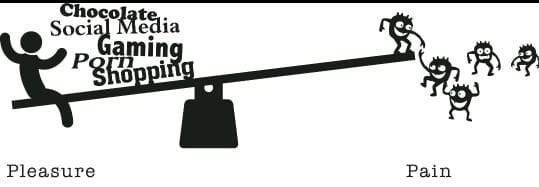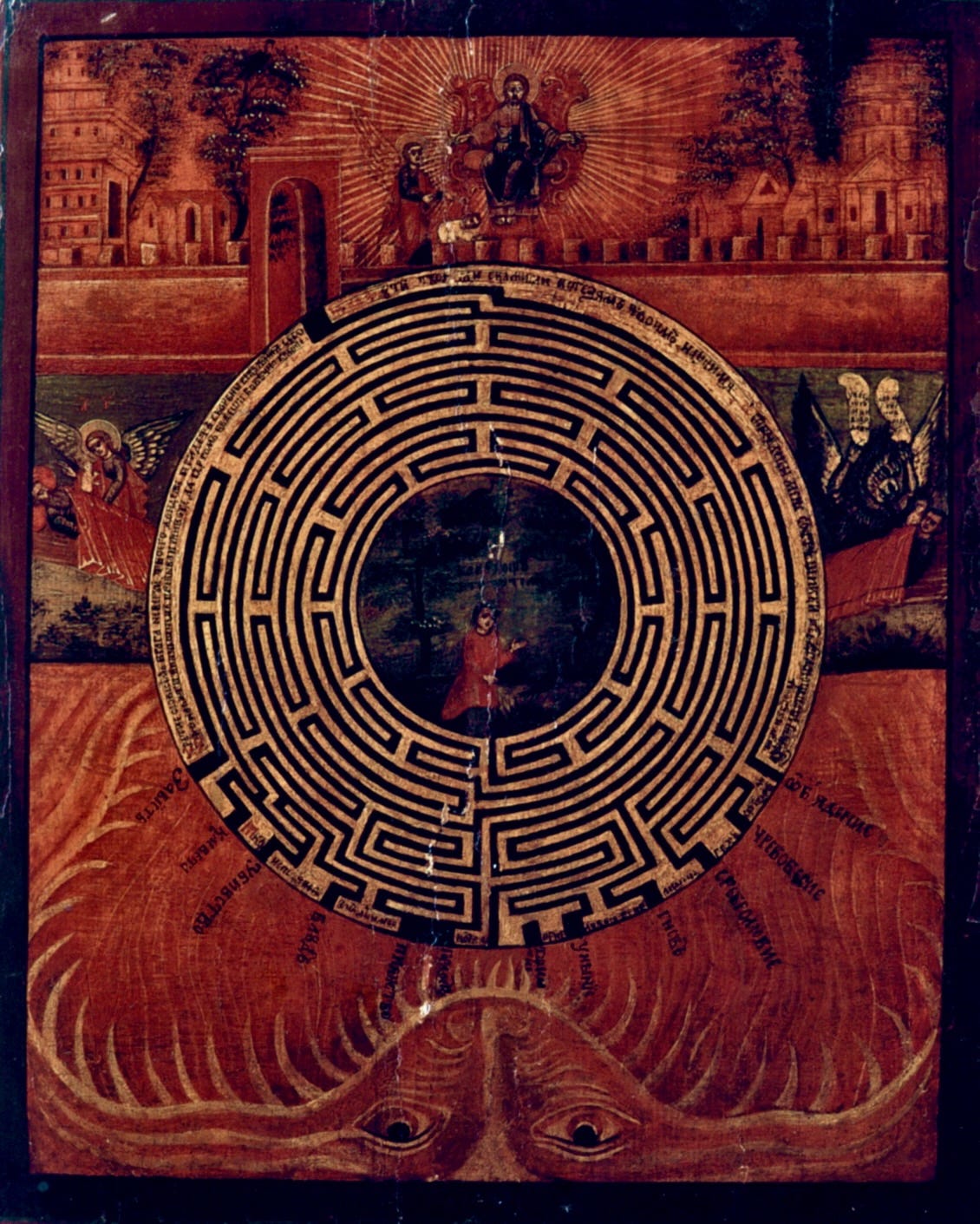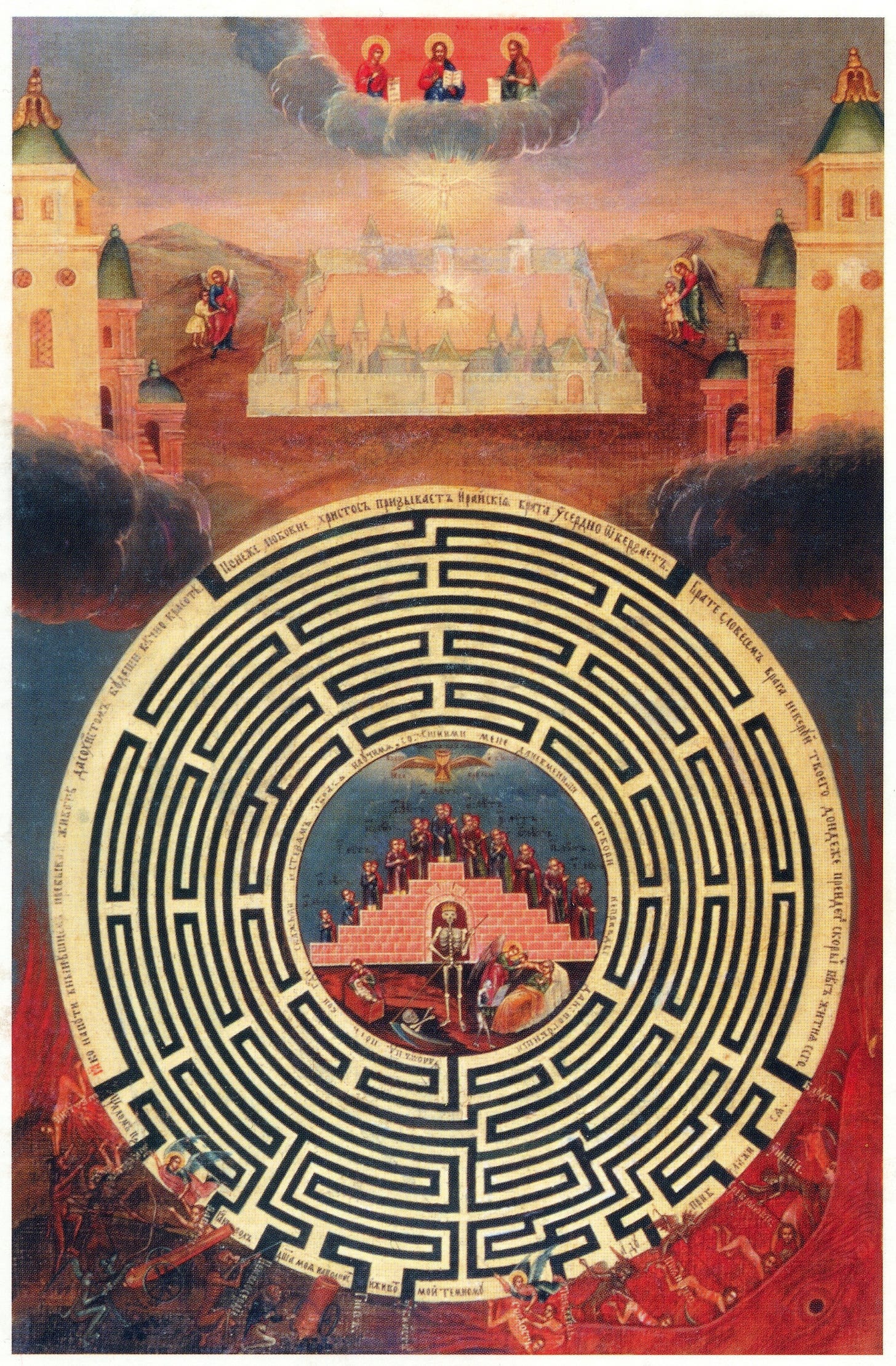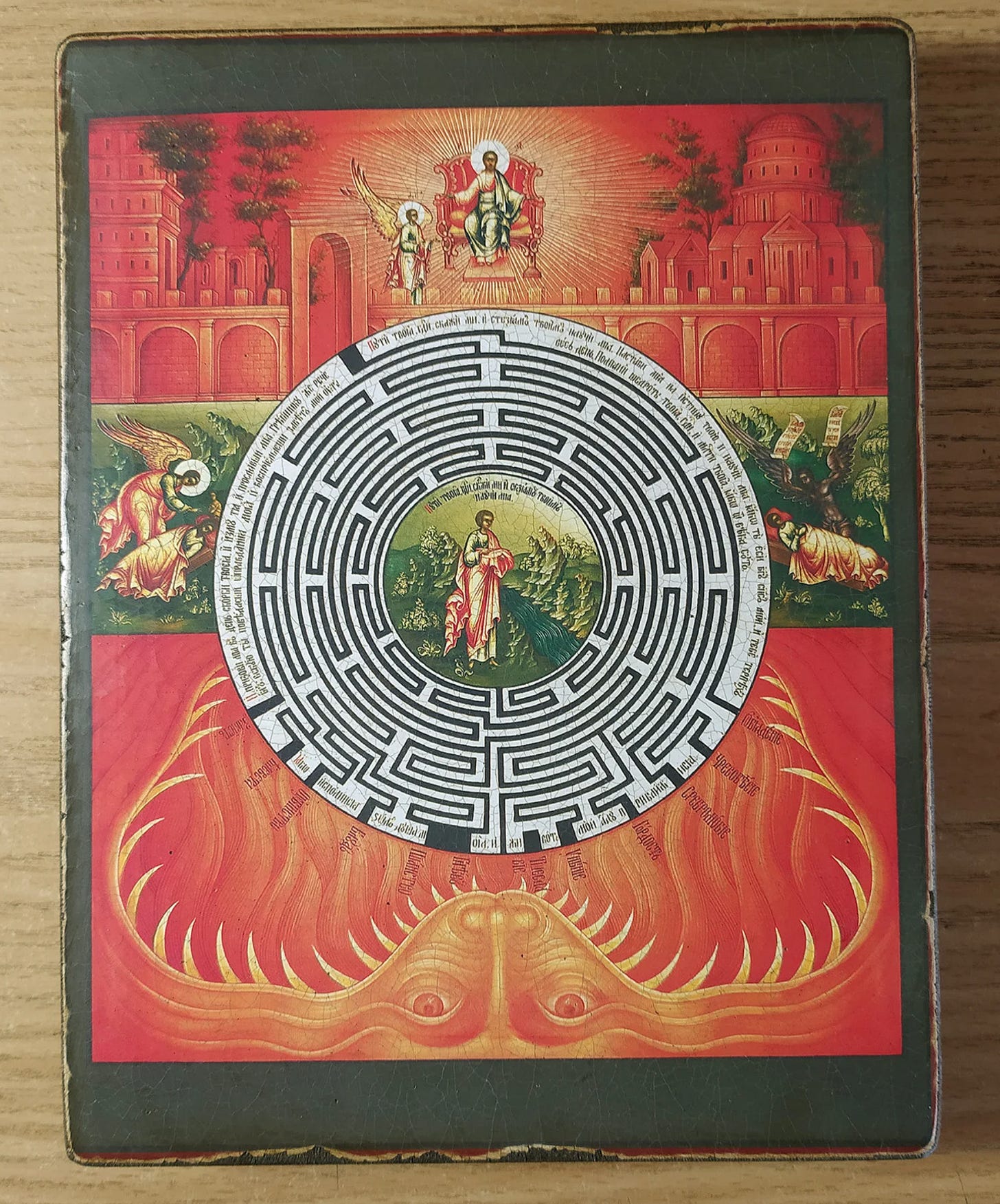The Image That Helped Me Quit Cannabis for Good
Weed's False Wisdom Exposed by an Antique Russian Icon
For years, I turned to cannabis in search of insight. I’d light up whenever I felt stuck—creatively, spiritually, emotionally—believing the high would offer clarity I couldn’t reach on my own.
And sometimes it felt like it did. Ideas came faster, patterns seemed clearer, and for a moment, the fog of life parted.
But over time, I began to see a different pattern: one of circular thinking, spiritual laziness, and stagnation masked as enlightenment.
It wasn’t until I encountered a 300 year old Russian icon that I finally saw the cycle for what it was.
That image didn’t just inspire me—it helped me stop.
Bad Sleep and Addiction
I know I’m not the only one who’s struggled with weed addiction.
On coaching calls, I hear the same story from young men again and again—and that’s no coincidence.
Sleep-disordered breathing often plays a role.

When your sleep is broken, your brain starts grasping for quick relief. Your prefrontal cortex—responsible for judgment and long-term thinking—gets worn down. Impulse control tanks.
That’s why I can relate so closely to these clients. I’ve been there myself.
Fool’s Gold
The allure of cannabis, for me, was always insight—a craving for wisdom.
I was most tempted to smoke when I felt stuck: stuck on a big life decision, a creative or business idea, or just stuck in the low grind of an uninspiring job or academic program. I believed weed could shake me loose—give me a fresh, inspired perspective.

But over time, I began to see it differently. Cannabis wasn’t guiding me. It was misleading me. The insights felt deep, but they weren’t. They were distortions—bad advice wrapped in a convincing package.
The rush of ideas I had while high didn’t come from God. If anything, they felt like the opposite: delusions dressed up as revelation. Gold-plated dog shit.
Creative Work and Cannabis
This past May, as I transitioned out of my seasonal tax prep job and back into my creative role at JawHacks, cannabis started calling my name again.
It’s a familiar cycle.
During tax season, I’m never tempted. My path is clear. Every day is mapped out: take client appointments, crank out returns, clear the inbox—wash, rinse, repeat. There’s no space (or need) for spiritual insight. Life is plug and chug.
And because tax season is intense—long hours, seven days a week—cannabis only stands to dull me. So I stay away.
But JawHacks is different. The work requires less execution and more vision.
And that shift—out of routine and into ambiguity—has always made me vulnerable to the illusion that cannabis helps me think more creatively. That it somehow “goes with” the process of planning and dreaming.
The Illusion of Wisdom
What felt like breakthroughs while high often turned out to be false paths and dead ends.
Take this example: I’d be stuck on the question of how to balance JawHacks and tax work during the off-season.
Sober, I’d feel a deep frustration about still needing to go into the tax office—clearing emails, finishing up overflow from before April 15. That frustration would build. I’d start fantasizing about leaving the tax business altogether, with all the emotional and financial consequences that would bring.
That tension—emotional, mental, even physical—would eventually push me toward weed. Just a little hit to take the edge off.
And then, high, I’d get an idea like: “Just wake up an hour earlier each day, before the wife and kids are up, and get your creative work done first thing in the morning.” It would feel inspired. Elegant. Like the problem had been solved.
But then 5:00 a.m. would come—and I’d hit snooze, groggy and burnt out from poor sleep and a weed hangover. I’d feel like garbage the rest of the day, thinking only about how good it would feel to recapture yesterday’s clarity with another hit.
And just like that, the cycle would begin again.
Weed hadn’t delivered real insight—it had just opened the door to another loop of false hope and dopamine cravings.
The Hellish Fallout Beyond the High
It’s hellish to feel like you need weed just to think clearly or keep burnout at bay.
But that addictive cycle was only the tip of the iceberg. Weed brought other evils too.
It wrecked my discipline—especially around compulsive behaviors like sugar cravings. My health depends on a very specific routine: a low-carb, animal-based diet, and no eating after 4 p.m. That’s how I manage my headaches.
But after the peak of the high comes the valley. And when I hit that low, I’m faced with two options: either smoke again, or chase some other quick dopamine hit—usually sugary snacks.

Those lows also pulled me into doom scrolling, impulse shopping, and nicotine—all of which I can keep in check when I’m sober.
Weed also made me impatient with fatherhood. The hours after work—entertaining, feeding, and putting the kids to bed—can actually be a joy when I’m grounded in the grit of sobriety.
But when I’m burnt out, it feels like hell.
And that strain doesn’t stay isolated. It bleeds into my marriage. I’m far more likely to snap at my wife in the evenings, under the pressure of child-rearing, if I’ve smoked.
Weed is the Dragon
In my life, weed is a wolf in sheep’s clothing.
It’s a conman.
Like the dragon in Beowulf, she dresses up like a sexy maiden and promises treasure. But in reality, she gives birth to a monster named Grendel.
Confronting the Cravings - Failed Perceptions
Over the years, I’ve tried out different mental frameworks—different “perceptions”—to help me break free from the cannabis cravings that hit whenever I feel spiritually stuck.
But none of them worked. The temptation never really went away.
One example: viewing weed as a disruptor of the dopamine reward system, based on the work of Andrew Huberman and Dr. Anna Lembke. It’s a scientifically sound framing—cannabis creates dopamine debt you eventually have to repay with interest.

But it never fully landed with me.
My addictive mind always found a workaround: “Sure, I’ll just cold plunge my way through the crash and be fine.”
And more importantly, it didn’t speak to the real root of my cravings: the pursuit of insight and clarity. I might have been willing to pay a steep biochemical price if it meant walking away with a nugget of wisdom.
Another lens that didn’t quite click was the 12 Steps model. The idea of surrendering your addiction to a higher power—letting God handle it—has deep merit. But for me, it felt incomplete. Like the biohacker approach, it didn’t speak to my core drive.
What I needed wasn’t just a reason to avoid addiction.
I needed a response to the desire underneath it all—a desire for truth, vision, and wisdom.
Flipping the Craving on Its Head
It wasn’t until I flipped the craving itself on its head that I finally began to gain control.
What I wanted was wisdom—but time and again, cannabis gave me delusion.
So I started searching for analogies—something visual I could summon whenever the urge hit. A simple mental image to cut through the noise and remind me of what was really happening.
Breakthrough #1 - The Sisyphus Analogy
The first image that came to mind was the story of Sisyphus—and it helped, to a degree.
I told myself that when I was sober, I was pushing a heavy stone uphill. That stone represented wisdom. Getting it to the top meant figuring it out—solving the algorithm of life.
But every time I hit a cognitive wall and reached for cannabis to break through, the stone would roll back down. I’d lose all the progress and have to start over.
It felt like dying in a video game and respawning back at level one.
Honestly, my life has often felt this way. If I had just stayed sober through those stuck moments—instead of smoking my way through them—I believe the stone would be much farther up the mountain by now.
But instead, I kept restarting. Stuck at the same spiritual checkpoints I first encountered when I started using weed as a high school sophomore in 2005.
The Sisyphus analogy wasn’t perfect, but it did help me realize something critical: cannabis wasn’t moving me forward. It was taking me backward.
It captured the spiritual setback I felt every time I used. And it gave me a visual reminder that smoking was undoing the very progress I craved.
Where Sisyphus Came Up Short
As helpful as the Sisyphus analogy was, it lacked something: the 12,000-foot view.
There was something too bleak about seeing life as nothing more than pushing a boulder up a hill. That kind of thinking actually made me want to smoke. If it’s all meaningless drudgery, then why not just blaze, eat, and be merry? Screw it.
But my Christian and Buddhist backgrounds wouldn’t let that view settle in. I couldn’t accept Sisyphus as the defining metaphor for life. I knew there was more—a larger story playing out.
A cosmic drama. A battle between good and evil. And each of us, a character with a role to play.
I began to see that my craving for wisdom wasn’t just about business insights or creative breakthroughs. It wasn’t just about time management, relationships, or problem-solving.
Buried beneath all those surface-level frustrations was a deeper hunger—one for spiritual clarity. For understanding how my life fits into something far bigger than this moment. Bigger than this life.
Not just the next 50 years, but the next 50,000. Not just this world, but all worlds—seen and unseen.
That’s why, when I came across the image of the spiritual labyrinth, something clicked.
It finally made sense why weed always left me feeling so guilty and disoriented. It wasn’t just a bad habit—it was taking me in the wrong direction entirely.
Breakthrough #2 - The Spiritual Labyrinth
The image below shows the Russian Orthodox Christian Spiritual Labyrinth—a visual tradition dating back hundreds of years.
This particular version comes from an 18th-century Russian icon that served as both artwork and moral instruction. It was used to guide believers through the challenges of life, portraying the human journey as a maze filled with temptations, trials, and turning points. Every decision leads either closer to salvation or toward damnation.
Sins like intoxication appear clearly on the path to hell.

When I first saw this image, something clicked.
It identified what my cravings for wisdom actually were: not just psychological frustrations, but spiritual crossroads. Each urge to smoke weed wasn’t just a bad habit flaring up—it was a decisive moment. A fork in the road.
Navigate well, and I stay on the path to wisdom—experienced as joy on earth and hope for heaven after. Choose poorly, and I end up spiraling toward hell, both in this life and beyond.
The labyrinth showed me that life is long, winding, and often unclear. Like a night drive, you can only see the next 200 feet lit by your headlights.

Cannabis is dangerous because it doesn’t shove you into hell instantly. In fact, the hours immediately after smoking often feel open, relaxed, even insightful.
But a few days or weeks later, the consequences start to emerge.
You're hooked again. You can't create without it.
You've had a string of minor fights with your wife because you're too burnt out to show up with presence and patience.
You made a handful of cannabis-fueled plans that no longer make sense—now you're stuck cleaning up the mess, feeling embarrassed by how much time you spent chasing those illusions.
Worst of all, the spiritual block that triggered the craving in the first place? It’s still waiting. Still unresolved. And now, you’ll need several weeks of sobriety just to rebuild enough mental and spiritual clarity to face it again.
The Labyrinth in Action
Now, whenever I feel spiritually stuck—and the urge to smoke my way to clarity starts creeping in—I turn to the icon. I study it and remind myself: smoking sends me spiraling down the labyrinthine path to hell.
The image helps decompress my sense of time. It reminds me that I’m in this for the long haul. That urgency I used to feel—the need to solve the problem right now—was often the very thing that pushed me to smoke.
But the labyrinth teaches patience. It reminds me that wisdom unfolds slowly.
I’m better off stepping away from the stress—taking a walk, listening to music, playing with my kids—and letting the insight come in its own time.
Because one hit might set me back a month. But steady sobriety keeps me on the path—toward real wisdom, in this world and beyond.

Comments
If you’ve ever used weed in search of insight—or wrestled with any habit that promises clarity but leaves you more confused—I’d love to hear about it.
How do you navigate your own crossroads?
Drop a comment below.






This was powerfully written. The maze is a brilliant metaphor. I especially resonated with the idea that the only way to navigate it is by making the right choice at each turn in life which requires trusting the code (God and His guidance) to exit at the right place.
We may not see how doing the right thing at any point is the right course and it may even often seem that we're heading away from our own interest which is difficult, even frightening. But when you believe that God is wise and loving and sees the entire maze from above, you find your trust in Him.
I also feel your insights speak more broadly to many (all) forms of mysticism too (as opposed to religion). They often promise transcendence but in reality they can offer an illusion of ascent that masks a descent into hedonism disguised as spirituality.